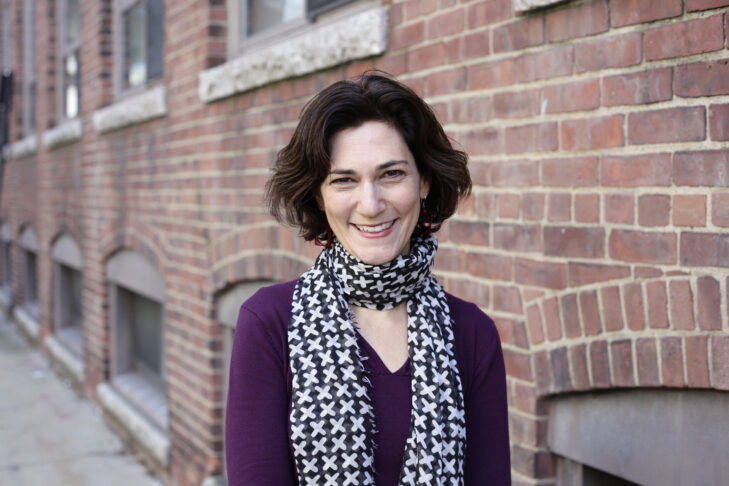Dina Kraft, a veteran American journalist based in Tel Aviv, was recently in Boston to give a behind-the-scenes look at “The Branch,” a podcast produced by Hadassah and hosted by Kraft. Each episode of The Branch tells the stories of Israelis and Palestinians who have come together as “living examples of a shared society.” Kraft spoke to an audience of almost 100 Hadassah members on a Sunday morning, and began her presentation with a personal story.
She recalled that when she was a young girl, her father brought her two necklaces from Israel that spelled her name in Hebrew and Arabic letters. “I wore these two necklaces together to watch the signing of the Camp David Accords on television,” Kraft recalled. “I had family in that part of the world and I knew this was important to them. I remember admiring how the Hebrew and Arabic letters nestled together on my neck. I like to think that even then I was thinking about the interconnections of the people who spoke those two languages.”
The necklaces not only portended Kraft’s work as a journalist, but serve as a de facto emblem for The Branch. As Kraft noted, the podcast is all about interconnections between Israelis and Palestinians, and between Israel and Palestine. She said she has always been “drawn to stories of people and places that history and society tell us are not supposed to intersect.”
With roots in Boston, Kraft attended the University of Wisconsin. She said she never imagined living anywhere but in America, but “the Middle East came to the Midwest where I was studying, and I needed to go to Jerusalem to figure out the place. I now live in Tel Aviv and I’m still trying to figure it out. Working on The Branch is part of this lifetime mission. People who live in Israeli and Palestinian areas are at the heart of my work.”
Each episode of the podcast explores the deep bond between an Israeli and a Palestinian who have teamed up to “forge meaningful relationships.” As her first example, Kraft spoke warmly of a 30-year relationship between Jonathan and Saud. The two men first met when Jonathan, an American Jew living in Jerusalem, was reporting from the Gaza Strip during the First Intifada. Saud was his “fixer”—someone who translated the language and culture of the region.
The two men immediately clicked and, as Kraft pointed out, they have been there for each other through difficult times. When Jonathan passed out while working in Gaza one time, Saud revived him. After Saud had a heart attack, Jonathan made sure his friend was treated at Hadassah Hospital in Jerusalem. Saud speaks movingly of being a patient at Hadassah and the extraordinary care he received from Israeli and Palestinian clinicians.
The spirit of Hadassah Hospital is further captured in an episode called “The Nurses Station.” Kraft spent time in the hospital’s dialysis unit, which she noted was the perfect incubator for the human stories she wanted to tell. Patients on the unit are often at the hospital four days a week for hours at a time and a lot of sharing happens during their treatments. “The nurses and families become intertwined,” said Kraft. The focus of “The Nurses Station” was two nurses—an Egyptian Jew and her protégée, a young Palestinian woman. On the podcast, Kraft asks, “How do we take this island of peace and connect it to the mainland?”
In another episode, Kraft met Yuval and Husam, two men who became the unlikeliest of friends. Yuval’s father was a spokesman for the Israel Defense Forces during the First Intifada, and Husam threw rocks. The teenage Husam then spent a year in a wheelchair after an Israeli soldier shot him. Today, the two men are partners in a touring company in Jerusalem that give visitors the powerful experience of seeing the country and its history from Israeli and Palestinian perspectives. Kraft observed that the podcast about these two men “emerged as one of the most intense [I worked on] for the way they talked about shared difficulties and their entangled identities.”
In Jaffa, a city where Israeli Arabs and a growing number of Israeli Jews are becoming neighbors, a poet and a rapper met at an open mic poetry night. An episode entitled “The Poet and the Prophet” explores how Neta, the Israeli poet, and Muhammad, the Palestinian rapper, founded System Ali, a hip-hop group through which the men do social justice work together.
As Kraft closed her talk, she mentioned her necklaces again as a symbol of peace—a reminder that Israelis and Arabs may one day live harmoniously on the relatively small patch of land that is Israel. As for her ongoing work on The Branch, Kraft said: “It is a privilege to bring these voices to the world. We don’t often hear these kinds of stories, but they give me hope of what Israel can look like in the future. These stories exist despite the tensions, the distrust and the hatred. Inequalities swirl around us in Israel. Yet I hope my necklaces are a peek of what can be.”



